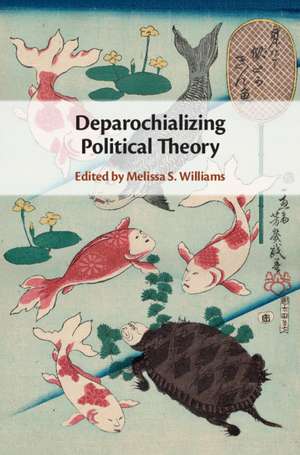Deparochializing Political Theory
Editat de Melissa S. Williamsen Limba Engleză Hardback – apr 2020
Preț: 695.06 lei
Preț vechi: 780.97 lei
-11% Nou
Puncte Express: 1043
Preț estimativ în valută:
133.00€ • 142.22$ • 110.89£
133.00€ • 142.22$ • 110.89£
Carte disponibilă
Livrare economică 28 martie-11 aprilie
Preluare comenzi: 021 569.72.76
Specificații
ISBN-13: 9781108480505
ISBN-10: 1108480500
Pagini: 324
Ilustrații: 2 tables
Dimensiuni: 157 x 235 x 23 mm
Greutate: 0.54 kg
Editura: Cambridge University Press
Colecția Cambridge University Press
Locul publicării:New York, United States
ISBN-10: 1108480500
Pagini: 324
Ilustrații: 2 tables
Dimensiuni: 157 x 235 x 23 mm
Greutate: 0.54 kg
Editura: Cambridge University Press
Colecția Cambridge University Press
Locul publicării:New York, United States
Cuprins
1. Introduction. The practice of deparochializing political theory Melissa S. Williams; 2. Deparochializing political theory and beyond: a dialogue approach to comparative political thought James Tully; 3. Recentering political theory, revisited: on mobile locality, general applicability, and the future of comparative political theory Leigh K. Jenco; 4. A decentralized republic of virtue: true way learning in the Southern Song period and beyond Youngmin Kim; 5. Deparochializing political theory from the Far Eastern Province Ken Tsutsumibayashi; 6. Is popular sovereignty a useful myth? Joseph Chan and Franz Mang; 7. Authoritarian and democratic pathways to meritocracy in China Baogang He and Mark E. Warren; 8. Deparochializing democratic theory Melissa S. Williams; 9. Teaching comparative political thought: joys, pitfalls, strategies, significance Stephen Salkever; 10. Teaching philosophy and political thought in Southeast Asia Terry Nardin; 11. Why globalize the curriculum? Duncan Ivison.
Recenzii
'This path-breaking book addresses the urgent problem of bringing diverse human ideas about legitimate political order into conversation with one another. The authors disagree fruitfully about precisely where to go and how to get there. Yet all of these essays brim with insight. The authors explore the concept of 'reciprocal elucidation', the surprising but convincing protection of claims to universalism, a possible demolition of the normative value of popular sovereignty, the possible globalization of a peasant ritual, a normative embedding of meritocracy in authoritarian and democratic regimes, how to teach, how to think – far too many insights to name here. The world needs this movement and every political theorist needs to read this book.' Jane Mansbridge, Harvard University, Massachusetts
'While the most pressing political challenges of our time are of a global nature, we lack a truly transnational political language and imagination to approach them. Deparochializing Political Theory is essential to overcoming this lacuna. This volume brings together leading scholars to engage in an exemplary dialogic quest for understanding one's own and other modes of political thought while avoiding cultural reification and imposition.' Rainer Forst, Goethe University Frankfurt
'This outstanding volume ranges from exciting new departures to thoughtful reflections on lifetimes of scholarship. Williams convincingly illustrates that there is no one answer or route to practicing comparative political theory; what we need right now is not a single road map, but a range of options and vigorous debate.' Stephen C. Angle, Wesleyan University, Connecticut
'While the most pressing political challenges of our time are of a global nature, we lack a truly transnational political language and imagination to approach them. Deparochializing Political Theory is essential to overcoming this lacuna. This volume brings together leading scholars to engage in an exemplary dialogic quest for understanding one's own and other modes of political thought while avoiding cultural reification and imposition.' Rainer Forst, Goethe University Frankfurt
'This outstanding volume ranges from exciting new departures to thoughtful reflections on lifetimes of scholarship. Williams convincingly illustrates that there is no one answer or route to practicing comparative political theory; what we need right now is not a single road map, but a range of options and vigorous debate.' Stephen C. Angle, Wesleyan University, Connecticut
Descriere
Leading political theorists demonstrate the transformative potential of de-centering Western traditions in the field of political theory.
